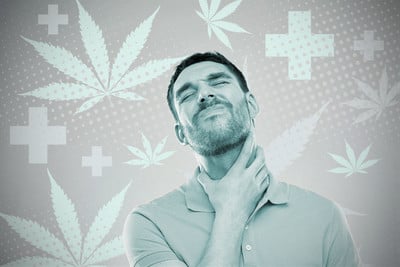.

Is Cannabis Safe To Use Before and After Surgery?
The idea of surgery doesn't exactly stir up feelings of excitement and joy. On the contrary, people often feel agitated and nervous before going under the knife. If you're a regular cannabis user, smoking up might seem like a great way to stop the rumination. However, surgery is one situation where cannabis can cause some serious risks.
Contents:
It’s only normal to feel nervous before going under the knife. Although surgeons undergo years of rigorous training, the mind can’t help but consider every possible outcome, no matter how unlikely. The benefits of surgery often outweigh the risks, but this fact does little to calm the nerves. If you are already a regular smoker, there’s no question that cannabis will put you at ease, but smoking weed before surgery can lead to a host of complications.
Below, we examine the risks surrounding using cannabis before, and after, surgery. Moreover, we discuss if CBD alone poses any surgery-related risks.
Preparing for Surgery
It takes a particularly fearless person not to experience dread, anxiety, and reluctance before heading to the operating table. But the period before surgery often includes more than mental stress. Many people spend the days prior in severe pain from herniated discs, broken bones, or one of many other medical conditions. If you use cannabis regularly, you’re going to crave the comfort that the herb brings during this uncertain time.
Inhaling or eating weed before surgery can pose substantial risks, as it changes how anaesthetics work in the body and may increase pain severity after an operation.
How Does Marijuana Use Affect Surgery?
Cannabis affects many different physiological systems. Cannabinoids such as THC dock to receptors located throughout the body, including the central nervous system. This mechanism of action causes physiological changes that can increase the risks associated with surgery. The biggest surgery-related issues posed by weed include:
- Desensitises the body to normal quantities of painkillers or anaesthetics
- Increases the risk of airway obstruction
- Reduces blood pressure and increases heart rate
- May increase pain scores following surgery


-
Types of Surgery
There are several types of surgery, and the risk cannabis poses changes based on the procedure being carried out.Lifesaving and life-changing major surgery requires the use of general anaesthetics. These substances cause the body and mind to drift off into unconsciousness. Bodily processes such as breathing slow down, and patients are often ventilated, with their vital signs closely monitored. Because cannabis alters the body’s response to anaesthetics and impacts blood pressure, it poses the greatest risk during these kinds of procedures.
Other forms of surgery use local anaesthetics. Instead of making the patient unconscious, these medications manage to block sensitivity—including the pain—in a specific area of the body while keeping the patient awake. Local anaesthetics are typically used during minor procedures such as skin and eye operations, and are less risky as patients are able to breathe freely, which eliminates the potential complications of ventilation.
Although using cannabis before minor surgery poses less of a risk, you should still disclose your recent cannabis use beforehand. The American Society of Anaesthesiologists published a list entitled “Eight Things to Tell Your Physician Anaesthesiologist Before Surgery”[1]. Smoking ranks as number two, and cannabis use follows in third place.
-
Anaesthetic Dosage
Of all the reasons to inform your doctor of your cannabis use, anaesthetic dosage stands as the most important. The amount of cannabis you use, and how often you consume it, can affect the way anaesthetics work in the body. The herb causes changes within the central nervous system, which means cannabis users require more anaesthetics than non-users. Research shows that daily and weekly users require three times the amount of propofol (a general anaesthetic) for sedation prior to endoscopy[2].
Marijuana and Surgery: Before, on the Day of, and After
It is recommendable to abstain from cannabis if you have an operation scheduled. If you decide to do it, just be mindful that your choice to consume the herb could impact your procedure. At the very least, you should let your doctor know about your cannabis consumption to help the medical staff make the right steps before, during, and after your surgery.
-
Using Marijuana Before Surgery
Using cannabis before surgery can increase the risk of complications. Abstaining from the herb—an obscene suggestion for many—can help to minimise these adverse happenings. While vaping cannabis may help to reduce the risk of damaging the lungs, smoking exposes the pulmonary system to carcinogens and other nasty chemicals that are known to affect lung function[3].
Reduced lung function caused by smoking can increase the length of time that patients require ventilation following general anaesthetic, while also increasing the risk of pneumonia post-surgery. Different methods of smoking expose the lungs to different levels of carcinogens. Spliffs and blunt wraps that contain tobacco take more of a toll. Smoking bongs and hitting dabs are slightly "cleaner" options, but both still involve combustion. Better yet, vaping substantially reduces exposure to toxic chemicals[4].
Regular cannabis smokers also experience higher levels of pain following surgery.
Although ongoing studies are exploring the effect of cannabis on chronic nerve pain, the herb appears to exacerbate acute pain experienced after surgery. The American Society of Anaesthesiologists reported on research examining a caseload of patients with leg fractures. The results showed that cannabis users required more anaesthetic, experienced higher pain scores, and required 58% more opioids each day than nonusers[5].
Abstaining from cannabis before surgery clearly reduces associated risks, and may help to lessen the pain experienced afterward. But how long should you keep your stash jars sealed? A lack of research means there’s no definitive answer. However, the lungs start to improve in as little as two weeks after ceasing smoking, so the sooner, the better.


-
Using Marijuana on the Day of Surgery
It’s no secret that cannabis helps people to relax and ease the mind. You may be tempted to light up on the day of your surgery, but physicians strongly recommend against this. Smoking a matter of hours before surgery can increase the risk of airway obstruction. A case study published in the journal Heliyon describes this phenomenon occurring in a patient who smoked cannabis four hours before a procedure. The paper advises against using cannabis at least 72 hours before undergoing general anaesthetic[6].
It’s unlikely that anybody with experience taking edibles would opt to chow down on a brownie the same day as a surgical procedure. This means of consuming cannabis is infamous for causing negative psychological states and panic—not what you want before a procedure! Plus, surgeons advise fasting for at least six hours before surgery to avoid the suction of food into the lungs in case of vomiting.
-
Using Marijuana After Surgery
You won’t get away with hitting a joint while in the ward, and scoffing an edible in a hospital bed flies in the face of the principle of set and setting. However, once discharged, it remains entirely up to you what you decide to do with your body. Some users find that cannabis helps to soothe them during this time and allows them to go easy on addictive pain medications. Interestingly, a 2006 study found that some patients given oral cannabis extract post-surgery did not require additional pain medication[7].
CBD Before and After Surgery
So, what about CBD? It works differently in the body to THC, and doesn’t even cause a high. Surely this cannabinoid has a place before surgery? Not so fast. Some surgeons advise patients to stop taking CBD several days before and after surgery, as researchers are still figuring out whether or not it exerts anticoagulant effects[8] CBD also interacts with a host of medications. As such, you should consult your doctor if taking CBD and planning to undergo surgery of any kind.
Marijuana and Post-Surgery Recovery
We understand you’ll probably be itching for a joint a few days after your operation. Keep in mind that your body just experienced a great degree of trauma (even if you didn’t feel it). While you’re healing, consider opting for methods of consumption that are kinder to the body, such as edibles in lower doses and oils. If you’re taking any medication (including pain killers) or have any underlying health conditions, you should consult your doctor before using CBD or cannabis after your procedure to rule out the risk of any adverse events.
Medical DisclaimerInformation listed, referenced or linked to on this website is for general educational purposes only and does not provide professional medical or legal advice.
This content is for informative purposes only. The data are extracted and gathered from external sources. Royal Queen Seeds and associated personnel are not responsible for the use or interpretation of the provided information.
- Eight Things to Tell Your Physician Anesthesiologist Before Surgery https://www.asahq.org
- High quantities: Evaluating the association between cannabis use and propofol anesthesia during endoscopy https://doi.org
- ACP Journals https://doi.org
- Levels of selected carcinogens and toxicants in vapour from electronic cigarettes https://doi.org
- Cannabis and Postoperative Pain https://www.asahq.org
- Redirecting https://doi.org
- A Multicenter Dose-escalation Study of the Analgesic and Adverse Effects of an Oral Cannabis Extract (Cannador) for Postoperative Pain Management | Anesthesiology | American Society of Anesthesiologists https://doi.org
- Anticoagulant effects of a Cannabis extract in an obese rat model - PubMed https://pubmed.ncbi.nlm.nih.gov









































